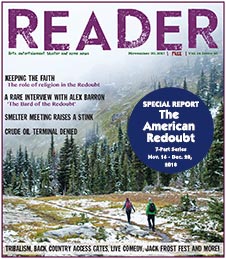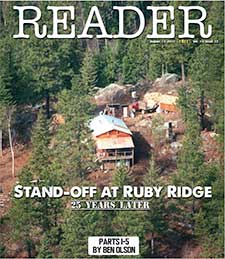Same-sex marriage debate surrounds tax law
By Cameron Rasmusson
Reader Staff
You wouldn’t figure routine tax conformity legislation would prompt a fierce debate over same-sex marriage and constitutional law. But that was the case in Boise on Monday, when Rep. Heather Scott, R-Blanchard, clashed with Deputy Attorney General Phil Skinner over Idaho’s legal authority.
The House Revenue and Taxation Committee passed IRS tax conformity legislation in a 13-3 vote Monday. But the bill received spirited opposition from Scott, who took issue with a portion bringing Idaho tax code in line with nationally recognized same-sex marriage. According to the Spokesman-Review, Idaho tax law previously required same-sex couples to rework their state taxes if they were filing joint federal taxes.
Scott questioned why the committee was considering the legislation, given Idaho still has a constitutional amendment defining marriage as between one man and one woman. According to the Spokesman-Review, this kicked off a debate on constitutional authority, with Skinner saying that the 1803 case of Marbury vs. Madison cemented “the United States Constitution [as] the supreme law of the land, and the U.S. Supreme Court is the body with the authority to interpret that law and declare what it is.”
“I apologize, I’m not a lawyer. But I do understand this little one here,” Scott replied, referring to the U.S. Congress’ enumerated powers in Article 1, Section 8 of the U.S. Constitution. “So I just wonder, in Section 8, which enumerated power are you using to accomplish this?”
Skinner countered that last year’s same-sex ruling was given authority through the constitutional powers of the U.S. Supreme Court. But Scott objected to passing law that contradicted the Idaho State Constitution.
“If we want to pass this part of the bill, then we need to make a change to our state Constitution,” she said.
Scott detailed her position on her Facebook page before the vote, receiving voices of support—and some criticism—in the comment section.
“If we do not want this definition as a state, we have the ability to change our state constitution,” Scott wrote. “A vote of yes on this bill will be against our state constitution. Watch how the committee votes. It does not matter which side of the issue you are on. I keep reading the U.S. Constitution Article 1 Section [8] and cannot figure out which enumerated power gives the feds the authority to define marriage.”











 Coming up this week! Don’t miss Live Music, the Summer Sampler, the Art Party, Monarch Grind, the Sandpoint Renaissance Faire, and more! See the full list of events in the
Coming up this week! Don’t miss Live Music, the Summer Sampler, the Art Party, Monarch Grind, the Sandpoint Renaissance Faire, and more! See the full list of events in the 